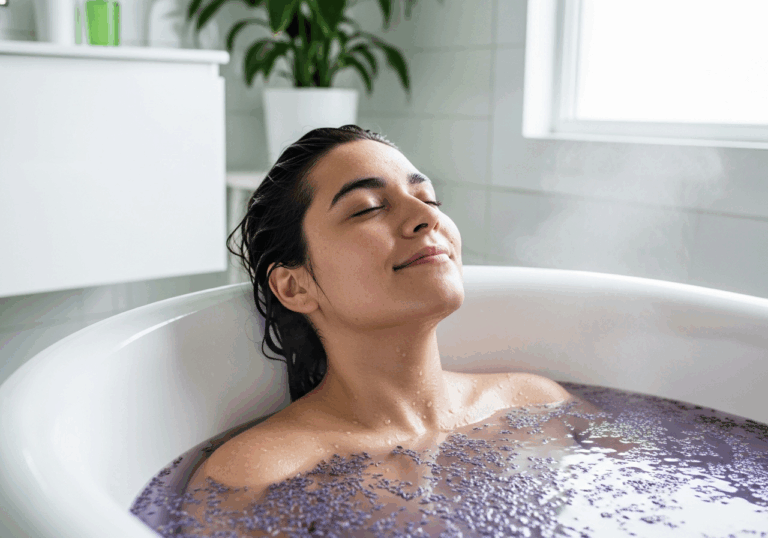Science-Backed Tips
Hydrotherapy: A Natural Mood Booster
Experience a 46% reduction in anxiety with hydrotherapy.
📊 Did you know?
💡 Why It Matters
1️⃣
Hydrotherapy can lead to a 46% reduction in anxiety, improving overall mental health.
2️⃣
The significant decrease in depression symptoms (SMD=0.53) can enhance quality of life for individuals suffering from mood disorders.
3️⃣
Incorporating hydrotherapy into treatment plans may reduce reliance on pharmacological interventions.
✅ Try These Micro-Tips
🎯
Engage in hydrotherapy sessions for at least 30 minutes, 3 times a week.
🎯
Consider warm water immersion as part of your self-care routine to alleviate stress.
🎯
Combine hydrotherapy with mindfulness practices for enhanced mood benefits.
🎯
Track your mood before and after hydrotherapy to measure personal improvements.
📚 The study
The findings reveal a significant reduction in anxiety symptoms, with a standardized mean difference (SMD) of 0.46, and an even more impressive decrease in depression symptoms, boasting an SMD of 0.53.
This robust evidence highlights the potential of hydrotherapy to enhance mental well-being through the soothing effects of warm water relaxation.
For individuals grappling with mood disorders, these results are not just numbers; they represent a pathway to improved quality of life.
By incorporating hydrotherapy into treatment plans, patients may find a natural alternative that reduces their dependence on pharmacological interventions.
As mental health continues to be a pressing concern globally, the implications of these findings are profound.
Hydrotherapy offers a holistic approach that not only alleviates symptoms but also promotes overall mental health.
Embracing this therapeutic method could be a game-changer for many, paving the way for a healthier, happier future.
The study underscores the importance of exploring non-traditional therapies in mental health care, making hydrotherapy a compelling option for those seeking relief from anxiety and depression.
❓ Frequently Asked Questions ❓
Learn more
What is hydrotherapy?
Hydrotherapy is a therapeutic practice that involves the use of water for pain relief and treatment. It can include activities like warm water immersion, swimming, and other water-based exercises.
How effective is hydrotherapy for anxiety?
A meta-analysis found that hydrotherapy can lead to a significant reduction in anxiety symptoms, with a standardized mean difference (SMD) of approximately 0.46. This indicates that hydrotherapy can be an effective intervention for improving mental health.
What impact does hydrotherapy have on depression?
The same meta-analysis reported a reduction in depression symptoms with an SMD of about 0.53. This suggests that hydrotherapy can enhance the quality of life for individuals experiencing mood disorders.
How often should I engage in hydrotherapy?
It is recommended to participate in hydrotherapy sessions for at least 30 minutes, three times a week. Regular engagement can maximize the mood benefits associated with this treatment.
Can hydrotherapy reduce the need for medication?
Incorporating hydrotherapy into treatment plans may help reduce reliance on pharmacological interventions. This can be particularly beneficial for individuals seeking alternative or complementary therapies for mood disorders.
What are some additional benefits of hydrotherapy?
Hydrotherapy not only helps alleviate anxiety and depression but can also promote relaxation and stress relief. Engaging in warm water immersion can be a valuable part of a self-care routine.
How can I enhance the effects of hydrotherapy?
Combining hydrotherapy with mindfulness practices can lead to enhanced mood benefits. This holistic approach can further improve mental well-being.
Should I track my mood when using hydrotherapy?
Yes, tracking your mood before and after hydrotherapy sessions can help measure personal improvements. This practice can provide valuable insights into how hydrotherapy affects your mental health.
Is hydrotherapy suitable for everyone?
While hydrotherapy can benefit many individuals, it may not be suitable for everyone, especially those with certain medical conditions. It is advisable to consult a healthcare professional before starting hydrotherapy.
What is the significance of the meta-analysis findings?
The meta-analysis highlights the robust mood improvement associated with hydrotherapy, demonstrating its potential as an effective intervention for anxiety and depression. These findings support the integration of hydrotherapy into mental health treatment plans.





